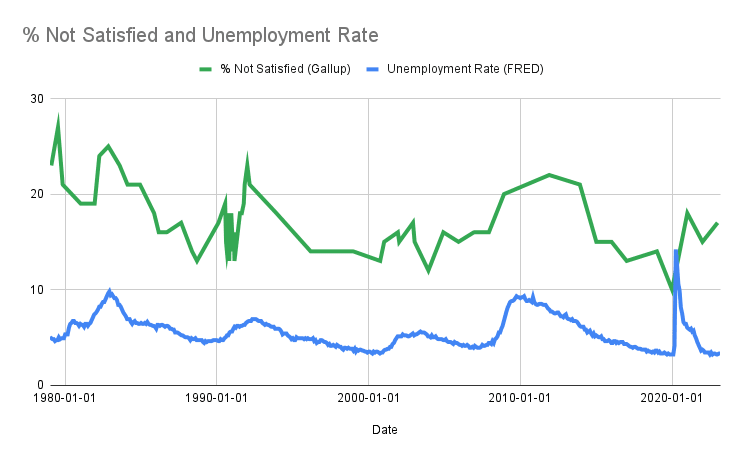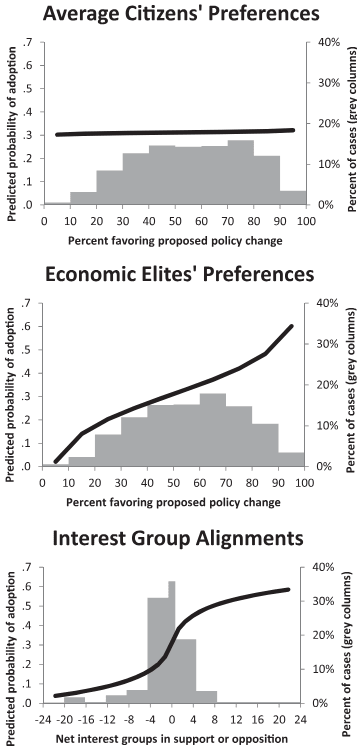Posts
Wiki Contributions
In America, people shopped at Walmart instead of local mom & pop stores because it had lower prices and more selection, so Walmart and other chain stores grew and spread while lots of mom & pop stores shut down. Why didn't that happen in Wentworld?
I made a graph of this and the unemployment rate, they're correlated at r=0.66 (with one data point for each time Gallup ran the survey, taking the unemployment rate on the closest day for which there's data). You can see both lines spike with every recession.

Are you telling me 2008 did actual nothing?
It looks like 2008 led to about a 1.3x increase in the number of people who said they were dissatisfied with their life.
It's common for much simpler Statistical Prediction Rules, such as linear regression or even simpler models, to outperform experts even when they were built to predict the experts' judgment.
Or "Defense wins championships."
With the ingredients he has, he has gotten a successful Barkskin Potion:
1 of the 1 times (100%) he brewed together Crushed Onyx, Giant's Toe, Ground Bone, Oaken Twigs, Redwood Sap, and Vampire Fang.
19 of the 29 times (66%) he brewed together Crushed Onyx, Demon Claw, Ground Bone, and Vampire Fang.
Only 2 other combinations of the in-stock ingredients have ever produced Barkskin Potion, both at under a 50% rate (4/10 and 18/75).
The 4-ingredient, 66% success rate potion looks like the best option if we're just going to copy something that has worked. That's what I'd recommend if I had to make the decision right now.
Many combinations that used currently-missing ingredients reliably (100%) produced Barkskin Potion many times (up to 118/118). There may be a variant on one of those, which he has never tried, that could work better than 66% of the time using ingredients that he has. Or there may be information in there about the reliability of the 6-ingredient combination which worked once.
Being Wrong on the Internet: The LLM generates a flawed forum-style comment, such that the thing you've been wanting to write is a knockdown response to this comment, and you can get a "someone"-is-wrong-on-the-internet drive to make the points you wanted to make. You can adjust how thoughtful/annoying/etc. the wrong comment is.
Target Audience Personas: You specify the target audience that your writing is aimed at, or a few different target audiences. The LLM takes on the persona of a member of that audience and engages with what you've written, with more explicit explanation of how that persona is reacting and why than most actual humans would give. The structure could be like comments on google docs.
Heat Maps: Color the text with a heat map of how interested the LLM expects the reader to be at each point in the text, or how confused, how angry, how amused, how disagreeing, how much they're learning, how memorable it is, etc. Could be associated with specific target audiences.
I don't think that the key element in the aging example is 'being about value claims'. Instead, it's that the question about what's healthy is a question that many people wonder about. Since many people wonder about that question, some people will venture an answer. Even if humanity hasn't yet built up enough knowledge to have an accurate answer.
Thousands of years ago many people wondered what the deal is with the moon and some of them made up stories about this factual (non-value) question whose correct answer was beyond them. And it plays out similarly these days with rumors/speculation/gossip about the topics that grab people's attention. Where curiosity & interest exceeds knowledge, speculation will fill the gaps, sometimes taking on a similar presentation to knowledge.
Note the dynamic in your aging example: when you're in a room with 5+ people and you mention that you've read a lot about aging, someone asks the question about what's healthy. No particular answer needs to be memetic because it's the question that keeps popping up and so answers will follow. If we don't know a sufficiently good/accurate/thorough answer then the answers that follow will often be bullshit, whether that's a small number of bullshit answers that are especially memetically fit or whether it's a more varied and changing froth of made-up answers.
There are some kinds of value claims that are pretty vague and floaty, disconnected from entangled truths and empirical constraints. But that is not so true of instrumental claims about things like health, where (e.g.) the claim that smoking causes lung cancel is very much empirical & entangled. You might still see a lot of bullshit about these sorts of instrumental value claims, because people will wonder about the question even if humanity doesn't have a good answer. It's useful to know (e.g.) what foods are healthy, so the question of what foods are healthy is one that will keep popping up when there's hope that someone in the room might have some information about it.
7% of the variance isn't negligible. Just look at the pictures (Figure 1 in the paper):

This post reads like it's trying to express an attitude or put forward a narrative frame, rather than trying to describe the world.
Many of these claims seem obviously false, if I take them at face value at take a moment to consider what they're claiming and whether it's true.
e.g., On the first two bullet points it's easy to come up with counterexamples. Some successful attempts to steer the future, by stopping people from doing locally self-interested & non-violent things, include: patent law ("To promote the progress of science and useful arts, by securing for limited times to authors and inventors the exclusive right to their respective writings and discoveries") and banning lead in gasoline. As well as some others that I now see that other commenters have mentioned.